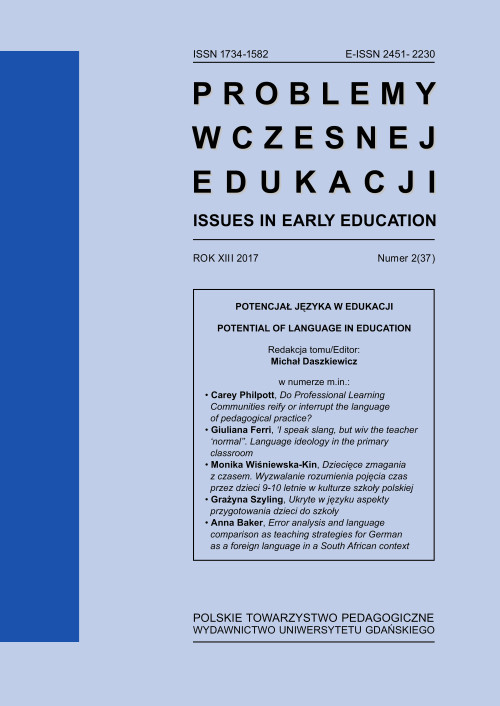‘I speak slang, but wiv the teacher ‘normal’’. Language ideology in the primary classroom
DOI:
https://doi.org/10.5604/01.3001.0010.5586Słowa kluczowe:
language ideology, habitus, Standard English, multilingual, non-standardAbstrakt
The paper is a work in progress investigating the perceptions of Standard English expressed by a group of children in their last year of primary school in a multicultural and multilingual educational setting in London. The theoretical framework employed to interpret the data, a series of group interviews with small groups, is that of language ideology. The idea brought forward in the paper is that language ideology is a habitus (Bourdieu, 1991) which attaches certain values to the prestige variety of a language, while devaluing non-standard varieties. Through the adoption of this theoretical lens, the paper attempts to evaluate the educational implications of this ideology.
Downloads
Bibliografia
Althusser L. (2008), On ideology. London and New York, Verso.
Bakhtin M.M. (2006), The dialogic imagination. Austin, University of Texas Press.
Block D. (2008), Multilingual Identities and Language Practices in a Global City: Four London Case Studies, “Journal of Language, Identity & Education”, 7(1).
Blommaert J. (1999), Language Ideological Debates. Berlin & New York, Mouton de Gruyter.
Blommaert J. (2005), Discourse. Cambridge, Cambridge University Press.
Bourdieu P. (1991), Language and symbolic power. Cambridge, Polity Press.
Cameron D. (1995), Verbal hygiene. London and New York, Routledge.
Cameron D. (2006), Ideology and language. “Journal of political ideologies”, 11(2).
Cameron D. (2007), A teacher’s guide to grammar. Oxford, Oxford University Press.
Cameron D. (2013), The one, the many and the Other: Representing multi- and mono-lingualism in post-9/11 verbal hygiene. “Critical Multilingualism Studies”, 1 (2).
Coupland N. (2007), Style. Language variation and identity. Cambridge, Cambridge University Press.
Dewey M., Jenkins J. (2010), English as a lingua franca in the global context: Interconnectedness, variation and change. In: M. Saxena and T. Omoniyi (eds.), Contending with Globalization in World Englishes. Bristol, Multilingual Matters.
DfE (2013). The National Curriculum. Available at https://www.gov.uk/government/publications/ national-curriculum-in-england-primary-curriculum [accessed on 17th May 2017].
Eagleton T. (1991), Ideology, an introduction. London and New York, Verso.
Fairclough N. (1992), Critical language awareness. London, Routledge.
Gramsci A. (1992), Prison notebooks, vol. 1. New York, Columbia University Press.
Hymes D. (1996), Ethnography, linguistics, narrative inequality. Toward an understanding of voice. London, Taylor and Francis.
Jenkins J. (2007), English as a Lingua Franca: Attitude and Identity. Oxford, Oxford University Press.
Kyambi S. (2005), New migrant communities: New integration challenges. London, Institute for Public Policy Research.
Milroy J. (2001), Language ideologies and the consequences of standardisation. “Journal of Sociolinguistics”, 5 (4).
Rampton B. (1995), Crossing: Language and Ethnicity among Adolescent. London, Longman.
Rampton B. (2015), Contemporary urban vernaculars. In: Nortier J. and Svendse B.A. (eds), Language, Youth and Identity in the 21st Century. Cambridge University Press, Cambridge.
Seidlhofer B. (2004), Research perspectives on teaching English as a Lingua Franca. “Annual Review of Applied Linguistics”, 24.
Trudgill P. (1995), Sociolinguistics, an introduction to language and society, London, Penguin.
Volonoshinov V.N. (1973), Marxism and the philosophy of language. Cambridge, MA, London, Harvard University Press.
Woolard K.A., & Schieffelin B.B. (1994), Language ideology. “Annual Review of Anthropology”, 23.

 Uniwersyteckie Czasopisma Naukowe
Uniwersyteckie Czasopisma Naukowe





